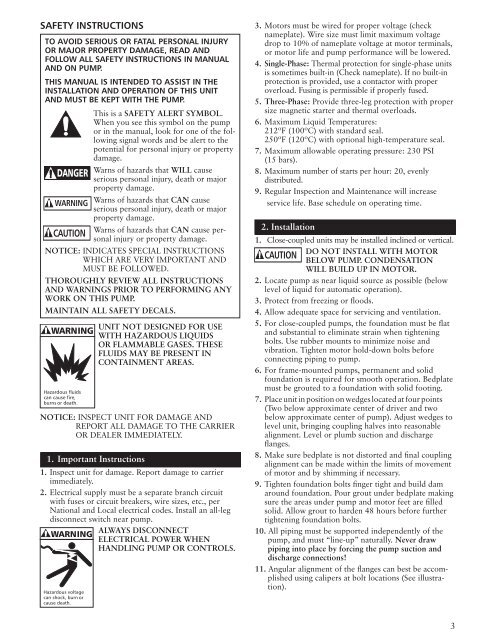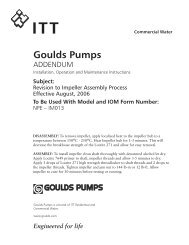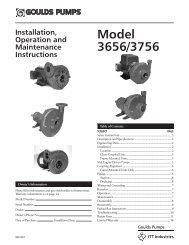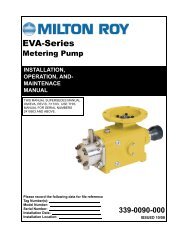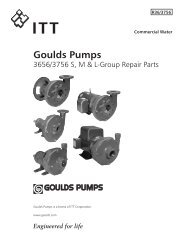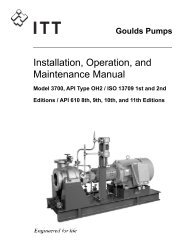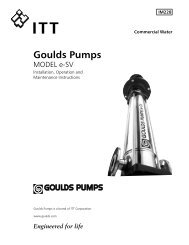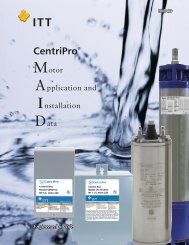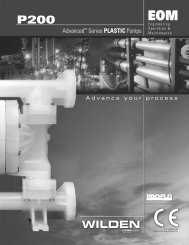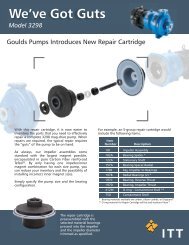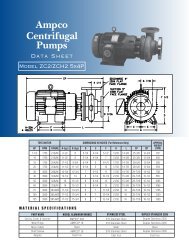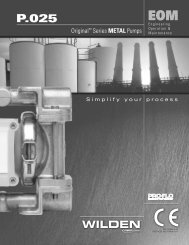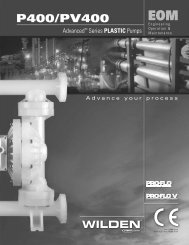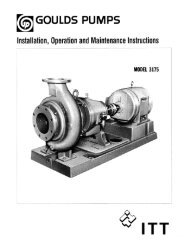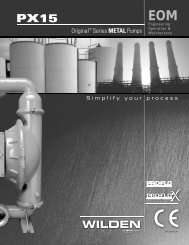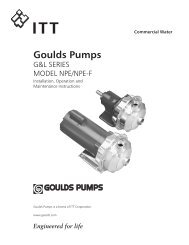Goulds Pumps
Goulds Pumps
Goulds Pumps
You also want an ePaper? Increase the reach of your titles
YUMPU automatically turns print PDFs into web optimized ePapers that Google loves.
SAFETY INSTRUCTIONS<br />
TO AVOID SERIOUS OR FATAL PERSONAL INJURY<br />
OR MAJOR PROPERTY DAMAGE, READ AND<br />
FOLLOW ALL SAFETY INSTRUCTIONS IN MANUAL<br />
AND ON PUMP.<br />
THIS MANUAL IS INTENDED TO ASSIST IN THE<br />
INSTALLATION AND OPERATION OF THIS UNIT<br />
AND MUST BE KEPT WITH THE PUMP.<br />
DANGER<br />
WARNING<br />
CAUTION<br />
This is a SAFETY ALERT SYMBOL.<br />
When you see this symbol on the pump<br />
or in the manual, look for one of the following<br />
signal words and be alert to the<br />
potential for personal injury or property<br />
damage.<br />
Warns of hazards that WILL cause<br />
serious personal injury, death or major<br />
property damage.<br />
Warns of hazards that CAN cause<br />
serious personal injury, death or major<br />
property damage.<br />
Warns of hazards that CAN cause personal<br />
injury or property damage.<br />
NOTICE: INDICATES SPECIAL INSTRUCTIONS<br />
WHICH ARE VERY IMPORTANT AND<br />
MUST BE FOLLOWED.<br />
THOROUGHLY REVIEW ALL INSTRUCTIONS<br />
AND WARNINGS PRIOR TO PERFORMING ANY<br />
WORK ON THIS PUMP.<br />
MAINTAIN ALL SAFETY DECALS.<br />
WARNING<br />
Hazardous fluids<br />
can cause fire,<br />
burns or death.<br />
UNIT NOT DESIGNED FOR USE<br />
WITH HAZARDOUS LIQUIDS<br />
OR FLAMMABLE GASES. THESE<br />
FLUIDS MAY BE PRESENT IN<br />
CONTAINMENT AREAS.<br />
NOTICE: INSPECT UNIT FOR DAMAGE AND<br />
REPORT ALL DAMAGE TO THE CARRIER<br />
OR DEALER IMMEDIATELY.<br />
1. Important Instructions<br />
1. Inspect unit for damage. Report damage to carrier<br />
immediately.<br />
2. Electrical supply must be a separate branch circuit<br />
with fuses or circuit breakers, wire sizes, etc., per<br />
National and Local electrical codes. Install an all-leg<br />
disconnect switch near pump.<br />
WARNING<br />
Always disconnect<br />
electrical power when<br />
handling pump or controls.<br />
Hazardous voltage<br />
can shock, burn or<br />
cause death.<br />
3. Motors must be wired for proper voltage (check<br />
nameplate). Wire size must limit maximum voltage<br />
drop to 10% of nameplate voltage at motor terminals,<br />
or motor life and pump performance will be lowered.<br />
4. Single-Phase: Thermal protection for single-phase units<br />
is sometimes built-in (Check nameplate). If no built-in<br />
protection is provided, use a contactor with proper<br />
overload. Fusing is permissible if properly fused.<br />
5. Three-Phase: Provide three-leg protection with proper<br />
size magnetic starter and thermal overloads.<br />
6. Maximum Liquid Temperatures:<br />
212ºF (100ºC) with standard seal.<br />
250ºF (120ºC) with optional high-temperature seal.<br />
7. Maximum allowable operating pressure: 230 PSI<br />
(15 bars).<br />
8. Maximum number of starts per hour: 20, evenly<br />
distributed.<br />
9. Regular Inspection and Maintenance will increase<br />
service life. Base schedule on operating time.<br />
2. Installation<br />
1. Close-coupled units may be installed inclined or vertical.<br />
Do not install with motor<br />
CAUTION<br />
below pump. Condensation<br />
will build up in motor.<br />
2. Locate pump as near liquid source as possible (below<br />
level of liquid for automatic operation).<br />
3. Protect from freezing or floods.<br />
4. Allow adequate space for servicing and ventilation.<br />
5. For close-coupled pumps, the foundation must be flat<br />
and substantial to eliminate strain when tightening<br />
bolts. Use rubber mounts to minimize noise and<br />
vibration. Tighten motor hold-down bolts before<br />
connecting piping to pump.<br />
6. For frame-mounted pumps, permanent and solid<br />
foundation is required for smooth operation. Bedplate<br />
must be grouted to a foundation with solid footing.<br />
7. Place unit in position on wedges located at four points<br />
(Two below approximate center of driver and two<br />
below approximate center of pump). Adjust wedges to<br />
level unit, bringing coupling halves into reasonable<br />
alignment. Level or plumb suction and discharge<br />
flanges.<br />
8. Make sure bedplate is not distorted and final coupling<br />
alignment can be made within the limits of movement<br />
of motor and by shimming if necessary.<br />
9. Tighten foundation bolts finger tight and build dam<br />
around foundation. Pour grout under bedplate making<br />
sure the areas under pump and motor feet are filled<br />
solid. Allow grout to harden 48 hours before further<br />
tightening foundation bolts.<br />
10. All piping must be supported independently of the<br />
pump, and must “line-up” naturally. Never draw<br />
piping into place by forcing the pump suction and<br />
discharge connections!<br />
11. Angular alignment of the flanges can best be accomplished<br />
using calipers at bolt locations (See illustration).<br />
3


